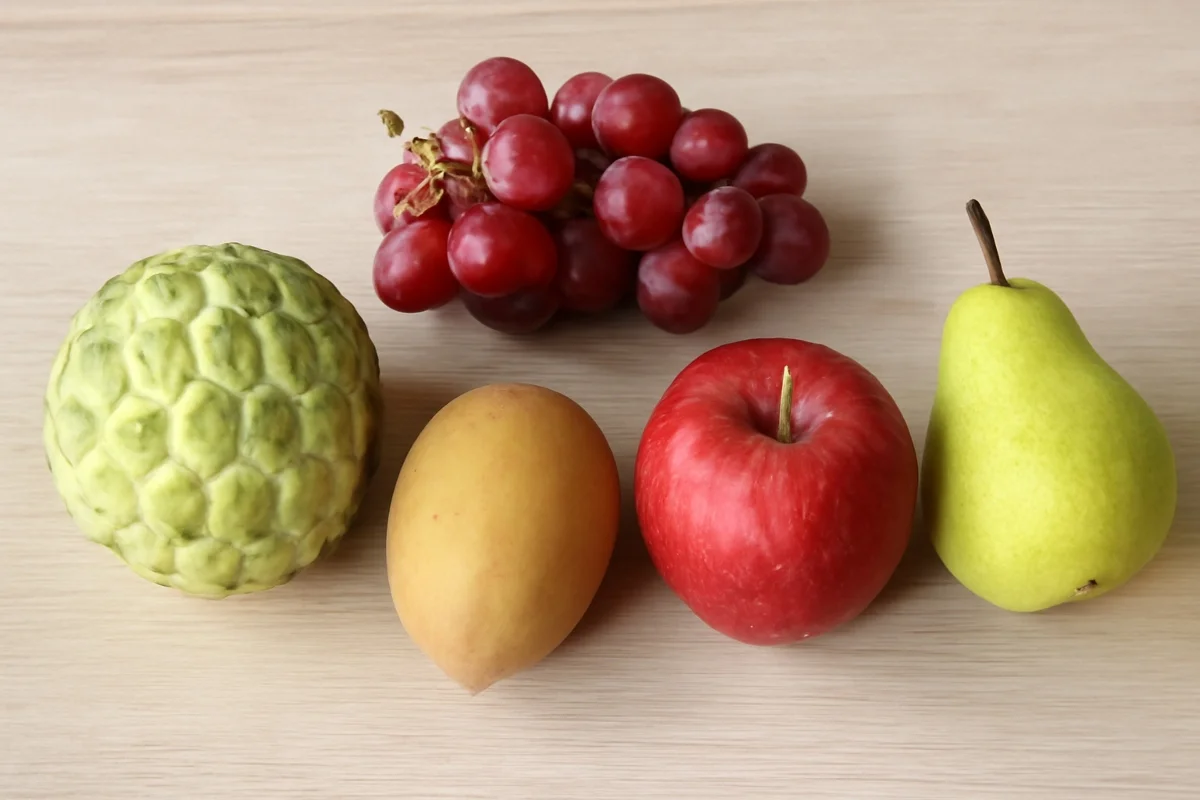Winter fruits for health usually steal the spotlight, but not all are friendliest for those with high uric acid. Some seasonal fruits quietly trigger hyperuricemia flare-ups, making joint pain worse without a doctor’s visit. Discover which five winter fruits to avoid this season to keep your uric acid levels in check and enjoy cold days with more comfort and less pain.
5 Winter Fruits to Avoid If You Have High Uric Acid
People with hyperuricemia often overlook how certain winter fruits can quietly worsen uric acid levels. While fruits seem harmless, some contain fructose and purine-raising compounds that trigger sudden spikes. Knowing which ones to limit can prevent painful gout flare-ups.
1. Custard Apple (Sitaphal): This fruit contains high levels of fructose, which can trigger a rise in uric acid levels, worsening hyperuricemia.
2. Grapes: Grapes’ natural sugars are known to promote uric acid production, potentially leading to higher levels in the body.
3. Chikoo (Sapota): Chikoo’s dense sweetness can contribute to a higher uric acid load, making it unsuitable for individuals with gout or high uric acid.
4. Apples: Although widely consumed, apples are surprisingly rich in fructose, which can cause uric acid spikes in sensitive individuals.
5. Pear: Pears, like other fructose-rich fruits, can aggravate hyperuricemia and should be consumed in moderation by those managing high uric acid.
How does Winter Fruits For Health Problem Relief Quietly Transform Wellbeing?
As winter chills the air, the body silently seeks nature’s remedies. Nutritionist Kiran Kukreja highlights that each winter fruit carries unique healing qualities, from strengthening immunity to balancing hormones, boosting skin glow, and supporting heart health. Mother Nature gifts us warmth, nourishment, and inner strength exactly when needed.
DON'T MISS
- Water chestnuts help manage diabetes by supporting blood sugar control.
- Indian ber combats iron deficiency and boosts low immunity.
- Custard apple aids thyroid balance and PCOS symptoms.
- Oranges contribute to lowering high blood pressure.
- Pomegranate relieves constipation and enhances gut health.
- Guava helps reduce high cholesterol levels effectively.
- Strawberries offer anti-ageing benefits and promote glowing skin.
- Apple supports liver detox and heart health naturally.
These fruits offer a natural way to address seasonal ailments while nourishing the body thoroughly. Including this group in the winter diet ensures a strong, balanced immune system and holistic wellness.
How Small Dietary Changes Reshape Energy, Mood And Daily Balance?
Introducing winter fruits for health into daily meals can reshape more than physical wellness; it influences energy levels, mood stability, and overall life balance. The vitamins and antioxidants from these fruits combat winter fatigue, boost mental clarity, and reduce inflammation.
Small, consistent changes in diet, aligned with seasonal needs, create resilience against winter blues and support steady, balanced daily rhythms. This natural approach to health through seasonal fruits for different health problems helps maintain vitality and emotional well-being throughout the colder months.
Winter fruits for health offer natural, effective relief for varied health issues without medical visits. Embrace the health benefits of seasonal fruits for lasting wellness.
Disclaimer: This content, including advice, provides general information only. It is not a substitute for a qualified medical opinion in any way. The methods and claims mentioned in this article should be considered as suggestions only; DNP India neither confirms nor denies them. Always consult a doctor before following any such suggestions/treatments/medications/diets.
